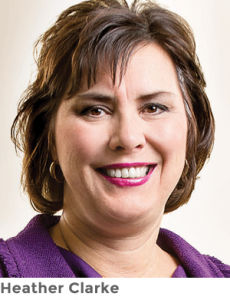Financial advisors will need to help their small business clients determine the kind of risks their businesses face and ensure that adequate insurance coverage is in place. “Advisors have an instrumental role to play as catalysts, helping clients determine the negative things that could happen in a particular business,” said Heather Clarke, Winnipeg-based vice-president of IG Insurance Services Inc. To manage these risks, insurance coverage will need to be put in place, and Clarke noted that the cost of not insuring can be greater than the cost of purchasing coverage. “Clients probably won’t want to think about the negatives, especially when they’re busy getting a business up and running,” she said, “but advisors need to make sure their insurance needs are not overlooked – or put off.”
To manage these risks, insurance coverage will need to be put in place, and Clarke noted that the cost of not insuring can be greater than the cost of purchasing coverage. “Clients probably won’t want to think about the negatives, especially when they’re busy getting a business up and running,” she said, “but advisors need to make sure their insurance needs are not overlooked – or put off.”
Types of coverage will differ according to the type of business your client is operating, but Clarke said disability insurance should be a given for sole proprietors to ensure adequate cash flow in the event that the business owner becomes disabled. “And so should life insurance,” she added. “The payout will take care of the needs of the family in the event of the owner’s death.”
As the business grows, other types of coverage will become increasingly important. Life and critical illness coverage should be taken out on the individuals whose skills and knowledge are vital to the business. “In the event of their death or disability, key person insurance will provide working capital to keep the business going, and hire and train a replacement,” said John Carinci, Toronto-based head of group and business markets at RBC Insurance.
Businesses that actively generate income will also need business overhead insurance to cover fixed expenses – such as salaries, rent, property taxes and utilities – in the event that the owner or partner becomes sick or disabled, and is unable to work in the business, Carinci said.
“Key person, business overhead and buy-sell coverage are often required in order for a business to access financing,” he added. “And the premiums may be tax-deductible as a business expense. But your client will need to discuss the product he is considering with a tax advisor.”
Depending on the type of business your client is operating, coverage may be required to protect against damage to or loss of property and commercial vehicles; errors and omission; and injuries to third parties caused by the business and its employees. Clarke suggested discussing these needs with an insurance broker; she also noted that professionals such as medical doctors and accountants may have their own insurance programs in place in some provinces.
Buy-sell agreements
Looking further down the road, life insurance can be purchased to help avoid disruptions to a business that could arise upon the death or disability of a partner or shareholder. Buy-sell agreements between business partners or shareholders can be set up to buy out the deceased or disabled person’s interest in the business, with life insurance funding the buyout.
“When a partner or a shareholder in the business dies, the spouse becomes the owner of his shares and has the right to sit at the table,” noted Robert McCullagh, lead financial advisor at Benefit Planners Inc. in Calgary. “This person may have no experience in the industry, and may have a different risk tolerance and time horizon than the other partners or shareholders. The buy-sell agreement should address the possibility of the passing of a partner or shareholder, and forced redemption of the shares from the estate.”
McCullagh said buy-sell agreements establish:
- A mechanism for putting a value on the business;
- For selling shares to other partners or shareholders;
- A timeframe and mechanism for payout;
- The specific events that will trigger a buyout.
“The partners or other shareholders could personally buy the shares but that is not always possible,” McCullagh said. “A life insurance policy should be purchased that names the corporation as owner and beneficiary. When the corporation receives the payout, the shares can be redeemed.” For partnerships, he recommends that each partner purchase a life insurance policy on the lives of the other partners. “Upon the death of a partner, the surviving partners can use the insurance proceeds to purchase the shares from the estate of the deceased.”
Disability insurance
A buy-sell agreement also needs to address the disability of a partner or shareholder, McCullagh said, “by establishing a period of time, say 12 or 18 months, after which time the partner or shareholder will have to leave the business. Statistically, after two years there is a low probability of someone returning to work after a total disability.”
 Wilmot George, director of tax and estate planning at Mackenzie Investments in Toronto, added that upon the death of a business owner, life insurance can be used to pay income and probate tax, keep the business operating until it is sold and fund the termination of the business. “Of course, coverage needs to be purchased well in advance,” he said.
Wilmot George, director of tax and estate planning at Mackenzie Investments in Toronto, added that upon the death of a business owner, life insurance can be used to pay income and probate tax, keep the business operating until it is sold and fund the termination of the business. “Of course, coverage needs to be purchased well in advance,” he said.
Life insurance is also a great way to equalize inheritances, he added. “If one child wants to inherit the business and a second child doesn’t want it, a life insurance policy can be purchased, typically with a payout equal to the value of the business, with the second child as the beneficiary.”
But he noted that there are tax considerations that this strategy needs to take into account. “The business will be subject to a tax hit in the late owner’s estate, while the insurance payout will not be. If the late owner had other assets, they will have to be used to top up the inheritance of the child who gets the business, and any excess in the estate can be divided 50-50.”
Life insurance can also be used to shelter a portion of a company’s profits from taxation, Clarke said. “Companies that have built up considerable retained earnings can use part of them to fund a life insurance policy,” she said. Upon the owner’s death, the beneficiary of the policy will receive a tax-free payout, and the company’s capital gain will be a lot smaller than if it had retained all its profits.







